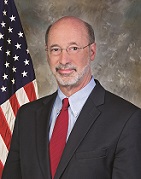

Diverse, Low-Cost Energy
Pennsylvania is home to the world’s second-largest energy field[1], which has led to reduced energy costs for businesses across the spectrum. Over the past six years, the natural gas supply alone has lowered wholesale electricity prices by more than 40 percent and purchased natural gas cost rates have decreased by more than 50 percent.
Six years ago, Pennsylvania imported 75 percent of its natural gas. Today, it is a net exporter of natural gas for the first time in 100 years. In 2014, the Marcellus Shale yielded a record-breaking four trillion cubic feet of natural gas, or 16 percent of annual U.S. consumption.[2]
The recent surge in availability of Natural Gas Liquids (NGLs) has presented unique growth opportunities in the plastics manufacturing industry. Natural gas provides ethylene, an inexpensive feedstock alternative, which drastically reduces the cost of plastics production.
Overall, the natural gas industry’s effect on Pennsylvania has been significant, increasing the economy by $11.2 billion in 2011[3] and generating $1.4 billion in taxes and supporting 62,000 jobs in 2012.[4]
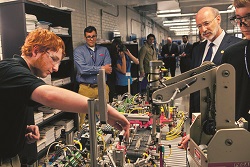
From natural gas resources to clean energy and other sources such as water, wind and nuclear, Pennsylvania has positioned itself as a leader in energy, offering resources and incentives that can fuel growth for businesses.
Strategic Location
Pennsylvania’s prime location in the Northeast U.S. offers convenient access to key markets, both nationally and internationally. Within a day’s drive, companies in Pennsylvania can access six of the top 10 markets in the U.S. and 60 percent of the population of the U.S. and Canada. More than $1 trillion of goods and services move through Pennsylvania’s three ports, four Class I railways, six international airports, 120,000 miles of highway and 1,850 total miles of interstate highway. According to the U.S. Bureau of Labor Statistics, last year the commonwealth boasted nearly 15,000 manufacturing establishments in the commonwealth, employing 568,000 Pennsylvanians, accounting for 10 percent of total workforce.
Recognized by Conexus Indiana in 2014 with an “A” in logistics industry health, Pennsylvania is committed to maintaining this standard by investing an additional $7.4 billion into roads, bridges and multimodal transportation systems over the next five years.
The State Transportation Commission and the Pennsylvania Department of Transportation (PennDOT) recently unveiled the 2015 12-Year Transportation Program, emphasizing a sizeable boost in transportation improvements. The new plan anticipates $63.2 billion being available over the next 12 years for improvements in all modes of travel including car and truck, public transit, bicycle and pedestrian, aviation, rail and ports.
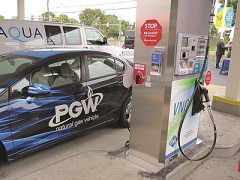
Boasting a labor force of more than 6.3 million[6], partnerships between Pennsylvania’s workforce training programs and world-class colleges and universities are growing stronger under the leadership of Governor Wolf.
Pennsylvania offers a range of job training programs tailored to meet the specific needs of both job seekers and employers. In 2014, more than $450 million was invested through both federal and state funding in job training for Pennsylvania’s workforce.
One such training program, WEDnetPA, provides critical training opportunities for businesses to invest in its workers, making sure they have the skills needed to compete in the global economy. Pennsylvania employers can apply for WEDnetPA training funding through a network of more than two dozen partners across the state, offering both essential skills and advanced technology training for qualified new and existing employees.
Pennsylvania manufacturer Northway Industries was able to provide in-depth training for its 140 employees by utilizing WEDnetPA, going far beyond what the company’s budget could afford.
“We needed the training to become more competitive in our industry. We implemented the lean concepts and installed three work cells in our plant,” said Robert Portzline, vice president of special projects. “The training allowed us to ramp up production, improve quality and quickly become very efficient in our work cells.”
An increased focus has also been placed on Pennsylvania’s Industry Partnerships program. This program is the first-of-its-kind in the nation that enables clusters of businesses in complementary industries to convene and identify common needs for workforce skill sets and to develop training programs that meet those needs.
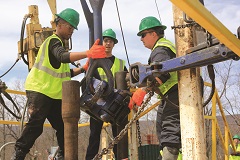
Pennsylvania’s universities are world-renowned and include four of the top 50 educational institutions in the nation[7]. In addition to providing employers with a highly educated workforce, Pennsylvania universities have produced industry innovations through partnerships with businesses, enabling the easy transfer of technology into commercial projects that are designed, engineered, produced, marketed and sold by Pennsylvania companies.
In July 2012, Penn State introduced a unique new intellectual property (IP) agreement, allowing companies to retain the IP from their industry-sponsored research. Penn State is one of only two educational institutions in the nation to take this approach to IP.
Penn State also brings the real world into the classroom through its Learning Factory, which provides engineering students with industry-sponsored and client-based capstone design projects. Companies pay $3,000 and provide real-life challenges, and students present their solutions during the College of Engineering Design Showcase. Following the shift in the University’s IP policy, students own the IP until the project is complete and sign off on it to turn it over to the companies.
Governor Wolf is also emphasizing the need for an increase in collaboration through his proposed Industrial Resource Center (IRC) Manufacturing Initiative, which provides funding to combine the knowledge and experience of the state’s IRC with breaking technological advances of the higher education sector. Answering Governor Wolf’s call, Pennsylvania’s seven leading engineering research universities are working together like never before to mobilize the talents of Pennsylvania’s faculty and students to spark innovation across the commonwealth. Commercialized research will help provide graduates with increased in-state opportunities upon graduation.
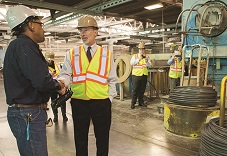
-----------------------------------------------------------------------------
[1] U.S. Energy Information Administration
[2] Semiannual Production Numbers, DEP Feb. 2015
[3] Marcellus Shale Coalition, “The Pennsylvania Marcellus: Leading the Way in Clean, Abundant Natural Gas.” http://marcelluscoalition.org/wp-content/uploads/2011/07/MSC_2011_Study_FactSheet.pdf
[4] Marcellus Shale Coalition, “Oil and Natural Gas in Pennsylvania,” p. 43. http://marcelluscoalition.org/wp-content/uploads/2014/06/PA-oil-gas-book.pdf
[5] Pew Charitable Trusts. “Industrial Energy Efficiency Thrives in Pennsylvania: Clean Economy rising.” http://www.pewtrusts.org/en/research-and-analysis/issue-briefs/2014/12/industrial-energy-efficiency-thrives-in-pennsylvania
[6] PA L&I, March 2015. http://www.portal.state.pa.us/portal/server.pt?open=514&objID=1216762&mode=2
[7] US News & World Report National University Rankings

